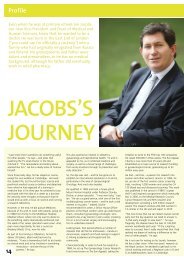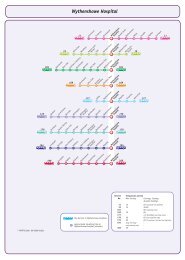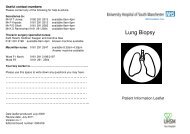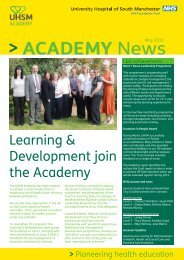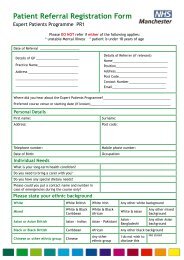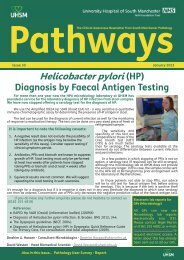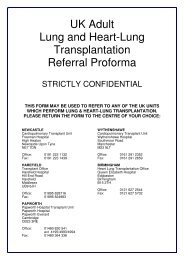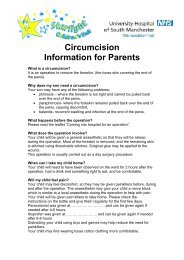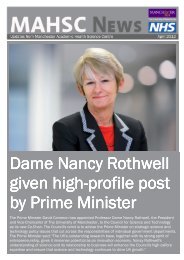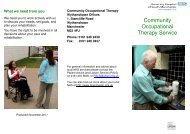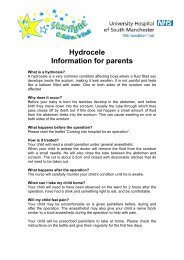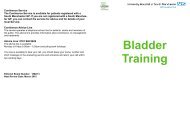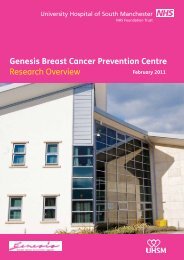A New Beginning 2012-7 - UHSM
A New Beginning 2012-7 - UHSM
A New Beginning 2012-7 - UHSM
You also want an ePaper? Increase the reach of your titles
YUMPU automatically turns print PDFs into web optimized ePapers that Google loves.
Your follow up<br />
• By General Practitioner<br />
You will be given a discharge summary with details of your operation and discharge medication.<br />
You should inform your GP practice when you arrive home and give them a copy of the discharge<br />
summary. The information of your operation, recovery and the medication you are on will also be<br />
faxed to your GP after discharge.<br />
You should contact your GP if you feel unwell or if you have any worries about your recovery.<br />
• Surgical out-patient appointment<br />
About 6 - 8 weeks after you go home from hospital you will see your surgeon for a check up at<br />
either the centre where you had your operation or at your local hospital. If you have not<br />
received your appointment by six weeks, please contact your surgeon’s secretary.<br />
Advice about financial matters<br />
Having heart surgery can lead to concerns about managing financial matters. There are agencies<br />
who offer free, confidential and independent advice on benefits, rent or mortgage arrears and<br />
possible rebates. Please inform the nursing staff as soon as possible if you would like to see the<br />
Welfare Rights Adviser whilst you are on the ward.<br />
Additionally there are people known as money advisers who offer advice on problems paying<br />
debts and negotiating repayments. Your local Citizens Advice Bureau will have the number of<br />
your local Welfare Rights Adviser and money advisers.<br />
Household tasks and gardening<br />
Everyone will progress at a different rate. It can depend upon your level of fitness and severity<br />
of your illness before your surgery, the nature of your surgery and your age. During activities it<br />
is important to take regular rest breaks, even when you do not feel tired.<br />
Activities should be restricted for approximately six weeks after your operation to allow time for<br />
the breastbone (sternum) to knit together and become stronger.<br />
Up to six weeks after your operation avoid activities which require pulling, pushing or a sudden<br />
burst of energy. Avoid carrying heavy shopping bags, pushing supermarket trolleys or lifting<br />
babies/toddlers. Do not lift anything heavier than about 5lbs (2.3 kg) in weight.<br />
Some people will see caring for the household and the family as mainly their responsibility. This<br />
can lead to them starting heavier household tasks sooner than they should. It is important not to<br />
feel guilty about leaving the housework for a while and letting others help.<br />
Remember the following information should only be used as a guide for returning to normal daily<br />
activities.<br />
Up to 2 weeks Take things gently. Read, listen to music or watch television.<br />
Make yourself a light snack.<br />
Week 3 Begin light activities, i.e. dusting, set the table, prepare<br />
simple meals, washing and drying dishes and tending indoor plants.<br />
Week 4 Increase activities to include light hand washing, ironing small items,<br />
changing the bed linen (do not pull the bed out).<br />
Begin activities outside (seated), such as light cutting and weeding.<br />
Begin light social activities i.e. visiting friends or going out for a meal<br />
when you feel ready.<br />
Week 5 Increase activities to include machine washing, cooking and ironing.<br />
Week 6 - 7 Increase activities to include sweeping, vacuuming, mopping floors, food<br />
shopping with trolley.<br />
Weeks 8 - 10 Wash and polish car, cleaning windows with regular rest breaks.<br />
Gardening may include digging, hoeing, raking leaves, mowing the lawn<br />
(powered mower). If possible, use a hose, rather than a watering can.<br />
Week 12 D.I.Y. – decorating, painting with regular rest breaks. Carpentry, moving<br />
furniture, trimming a hedge.<br />
Limit the amount of sustained work that you do with your arms above shoulder height as this can<br />
increase the workload of the heart.<br />
In the long term, certain activities including lifting or pushing heavy weights require a degree of<br />
caution. If you are keen to undertake these activities you can discuss this when you attend your<br />
cardiac rehabilitation programme.<br />
22<br />
31




